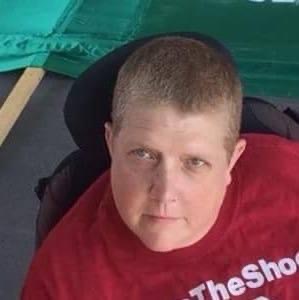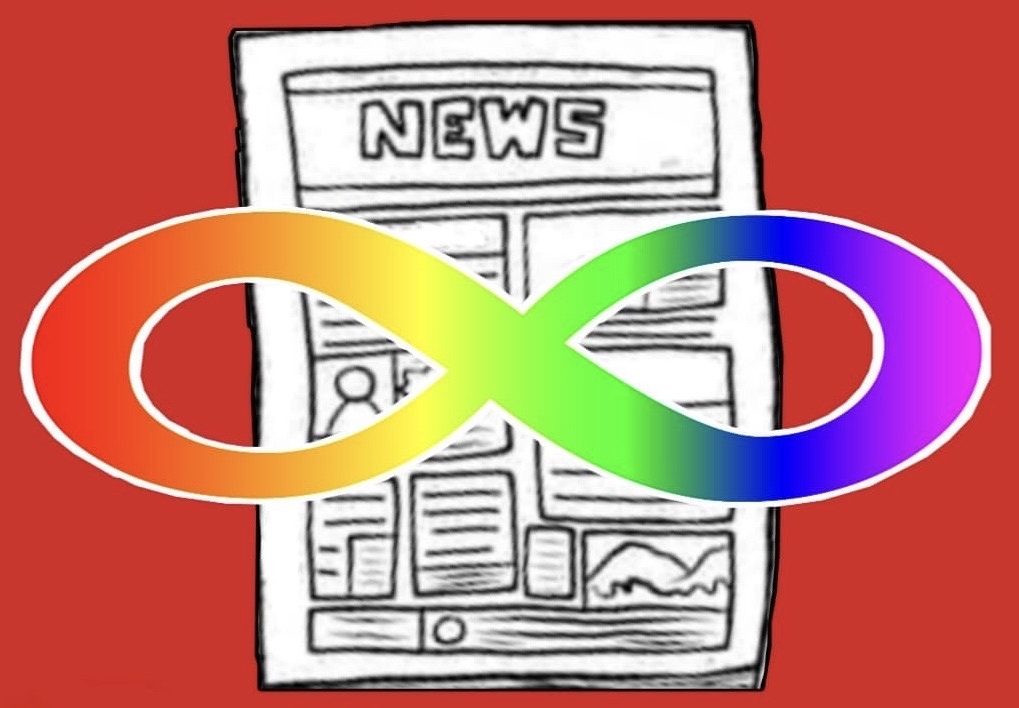
This week, we have interviewed Cal Montgomery, who became nonspeaking in 2001 but partially regained speech in 2018, is a board member of the Autistic Self Advocacy Network (ASAN). He also writes an incredible blog, Cal’s Blog: A Blog About Disability
Neurodiversity News: Tell me about yourself and what you do.
Cal Montgomery: I got teargassed at my very first 4th of July because my parents got too near Vietnam War protesters. I was less than 5-months-old. I like to imagine that’s where my interest in activism started. It’s a good origin story.
I got my first disability related job when I was 12 and became an activist at 14, but those were two streams through high school, and when I went off to college, I wanted to be a university professor. I was all set to start grad school when I was institutionalized in psych facilities for four and a half years. It was meant to be for the rest of my life (partly because I was self-injurious as hell under that amount of external control), but the fourth facility I was in burned down one day in early 1992, and they were short of beds so I managed to get out. I was a member of a queer youth group, BAGLY, for a bit and they really got me through a time when I was so traumatized that I was nonfunctional. It was hard to get a job, but group homes for people with I/DD would hire me so I worked there for a few years before I couldn’t stomach the system anymore. More recently, I have done short-term stays in nursing facilities. So I have a lot of experience with different kinds of disability-specific institutions and different roles in them.
I found the internet in early 1994, and Autism Network International soon after that, and started merging it all—my personal and professional interests in disability and political activism. And disability rights have remained my primary interest ever since. I’ve done a lot of different pieces, like policy analysis and lobbying and civil disobedience, but I have always done a certain amount of reading and writing. Mary Johnson at Ragged Edge gave me a lot of early support, which means that a lot of old-timers know my name, even if they aren’t quite sure why.
Since COVID, most of my stuff has been social media writing.
NN: What is your role at ASAN, and how did you get started with them?
CM: I had worked more in the independent living movement than the neurodiversity movement and I publicly identified outside the autistic community as disabled rather than autistic—I remember when “Critic of the Dawn” came out, Mel Baggs asked me if I had identified as autistic by mistake because it was unexpected. It wasn’t actually until 2017, when I was with Chicago ADAPT and we gave Julia Bascom an award for ASAN’s innovative work in the Medicaid advocacy that year that I even met people from ASAN, though of course I knew who they were. I was very fanboyed out that day. We hit it off and I did a little work with them, and they invited me to join the board. It took me a minute to be sure they wanted me, because I am definitely more abrasive than I thought they would want, but they did. So now I serve on the board.
NN: What are some of your achievements in advocacy that you’re most proud of?
CM: When I was institutionalized, although I was terrible at actually escaping, I pulled off organizing a fake mass escape that was pretty effective.
Early on, I was a mentor of Mel Baggs’ and sie has told me I played a role in the activist sie became. I played a role in the wars of Aspie supremacy and have a small part in the neurodiversity movement not sidelining nonspeakers and people with intellectual disabilities.
I stood up to Bruce Darling earlier and more firmly than almost anyone in ADAPT, even when other members were harassing and abusing me for it. In general, because I have been unemployed since 2000 and am not constrained by 501(c)(3) restrictions and don’t have a boss, I am freer to speak out than most people, and I have done so even in the face of threats and of physical violence frequently enough to be able to respect myself. This is despite having spent most of my life as a very shy and anxious person; I have been able to push myself to do some things I believed were right even when they terrify me. And eventually, I became less afraid.
I have spent a lot of time studying certain thinkers with intellectual disabilities and have been able to push some people who thought disability rights was only about mobility disability to be more inclusive — though I am also ashamed of how slowly we have progressed on that front.
I have had some success in pushing the independent living movement to be more inclusive, though again not nearly enough. When I started, many people were quite open about never tolerating people with I/DD in the movement. This has definitely been a team effort, but I think I contributed.
NN: Who are your greatest inspirations?
CM: I can’t really even answer this question because there are so many I could go on for hours. So many of the people I have encountered have inspired me in one way or another. I have had more role models than anyone deserves. Some are older, some are younger. Some are disabled, some not. Some have educations, some don’t. My Aunt Nancy was one of the first. She was an incredible woman. She worked at a used car dealership and raised my cousins and was snarky and tough and loving and her house was the safest place I have ever been. She knew how to make people feel like they really mattered. But there have been so so many.
NN: What do you hope to achieve in the future?
CM: I hope to survive long enough that I get to hug loved ones I haven’t even seen since COVID started (And I am not even a hug fan).
I hope to be brave and insightful and a team player. I hope to learn something every day. I hope to be good at passing the mic when I should. I hope to earn enough trust to be called out when I fuck up, and to have enough humility to live up to that trust. I hope to get up and keep fighting every time I am knocked down. I hope to be a better person than I was raised to be. I hope to never make the people I admire ashamed of me. My family is ashamed of me, but I don’t agree with their idea of who I should be, so whatever. But there are people whose opinions matter a lot to me.
I hope to help create a world in which everyone has the basic building blocks of a life that is meaningful to them. I hope to help create a world in which nobody ever has to endure the kind of brutality I have experienced so much of. I won’t see this world come into being, but I hope to do my bit to help deliver it to those coming after us. I hope to move the Overton Window so that people with more finesse than I will ever muster can achieve our goals faster and more easily. I hope to make a net positive contribution to the world.
I hope that when my life is over, it will have mattered that I was here. I hope—I have promised myself—that whatever else, I will die free. Not everyone I came up with got a chance at that. I didn’t get the life I wanted, as so many others haven’t. But I think a free death is achievable.
